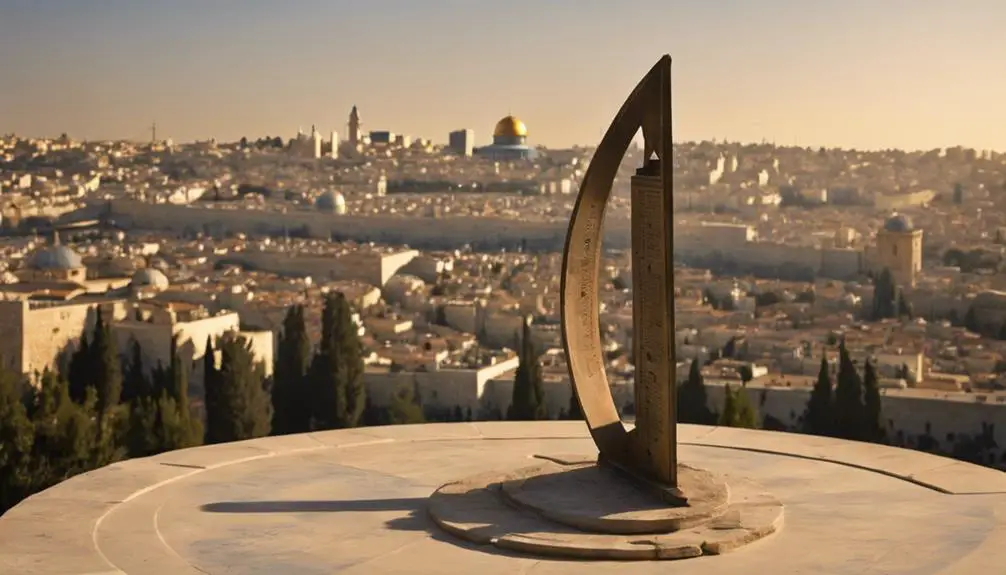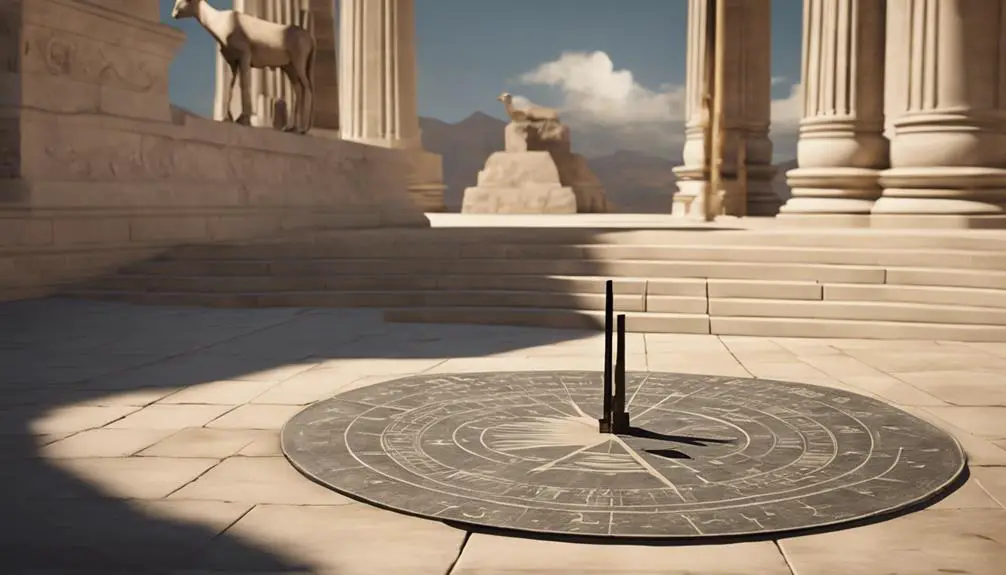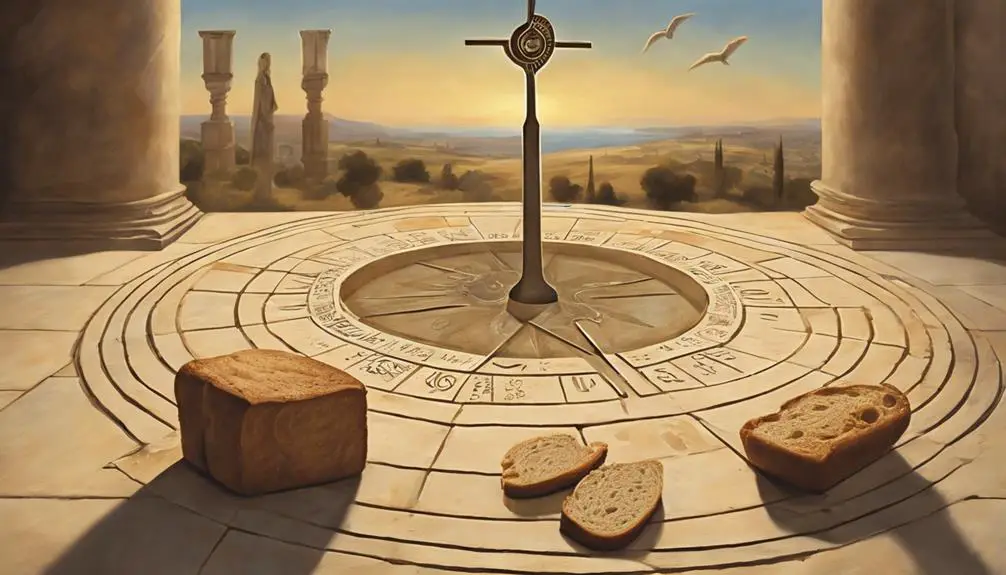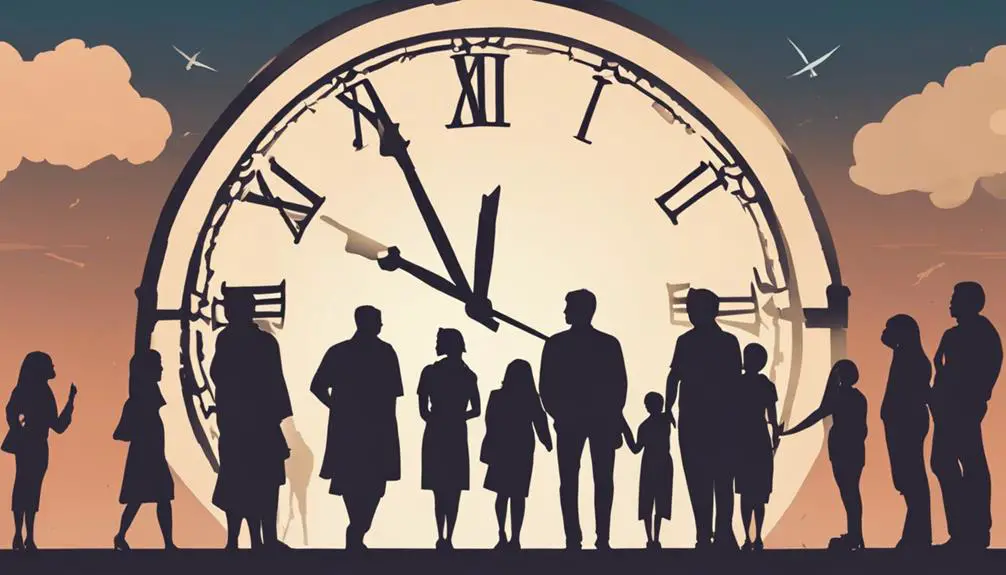Highlighting the significance of the 9th hour in the Bible, delve into its deep-rooted meaning and its pivotal role in history.

What Is the 9th Hour in the Bible
When you think about the crucifixion of Jesus, you might recall it happened at the 9th hour, an impactful moment that's resonated through centuries. This time marker isn't just a biblical timestamp; it holds layers of significance that stretch from the Old Testament to New Testament narratives.
But what does the 9th hour truly signify, and why has it been pivotal in both historical and theological contexts? As you explore this concept further, you'll uncover connections that might not only deepen your understanding of biblical events but also offer insights into their enduring relevance today.
Key Takeaways
- The 9th hour in the Bible signifies a time of prayer, reflection, and divine intervention.
- It marks critical biblical events, including Jesus' crucifixion and the Pentecost, aligning with ancient Jewish prayer times.
- This hour symbolizes the fulfillment of Old Testament prophecies and the transition to the New Covenant.
- Understanding the 9th hour offers a deeper spiritual connection and insight into biblical narratives for modern believers.
Definition and Origin

In biblical context, the 9th hour refers to a specific time of day that holds significant religious and historical implications, traditionally understood to be around 3 p.m. based on Jewish timekeeping practices. This period of the day is deeply rooted in the ancient method of time measurement, which significantly differs from the modern, more precise methods used today. You'll find that understanding these ancient practices sheds light on the broader cultural differences in perceiving and valuing time across civilizations.
The Jewish day, as referenced in the Bible, begins at sunset, not at midnight, which is the standard in contemporary Gregorian calendar practices. This means that the hours are counted starting from what we'd consider the evening, leading to the 9th hour falling in the mid-afternoon. This method of timekeeping, while it might seem foreign to you now, was quite common in ancient cultures, emphasizing the role of natural light in daily activities and religious observances.
Cultural differences in time measurement not only reflect the practicalities of ancient life but also carry significant symbolic meanings. For the Jewish people and early Christians, certain times of day were imbued with spiritual significance, making the 9th hour a moment ripe with divine symbolism. This time was often associated with prayer and reflection, a practice that underscores the interconnectedness of daily life, religion, and the natural world in ancient times.
Analyzing the 9th hour through the lens of time measurement and cultural differences allows you to appreciate the depth and complexity of biblical narratives. It's a reminder that the scriptures are more than just spiritual texts; they're also historical documents that offer insights into the lives and beliefs of ancient peoples.
Historical Context

Delving into the historical context, you'll discover that the 9th hour, marked as a pivotal moment in biblical narratives, served as a backdrop for significant events shaping early Christian and Jewish traditions. Understanding this time requires a grasp of ancient timekeeping methods and daily practices, which were intertwined with religious observances and societal norms.
The 9th hour, traditionally around 3 PM in modern time, was significant in the daily rhythm of life in ancient societies. This period was not only crucial for religious practices but also for the social and economic activities of the time. The ancients relied heavily on the natural cycle of the sun to divide their day, a practice that influenced both their work and worship schedules.
Timekeeping Method |
Description |
|---|---|
Sundials |
Used to track the sun's shadow, providing a rough estimate of time. |
Water Clocks |
An early form of timekeeping that used the flow of water to measure time intervals. |
Hourglasses |
Though less common, these were used in later periods for more precise time measurement. |
Solar Positions |
Observations of the sun's position in the sky were crucial for determining the time of day, particularly for religious observances. |
Incorporating these timekeeping methods into their daily practices, the people of biblical times organized their lives around a series of marked periods, of which the 9th hour was especially noteworthy. It was a time when work typically paused, and communities might gather for prayer or reflection, embodying a blend of practicality and spirituality that characterized the era. This understanding not only enriches our grasp of biblical references to the 9th hour but also invites a deeper appreciation for the complexities of ancient daily life.
Significance in the Old Testament

Building on our understanding of ancient timekeeping practices, let's explore how the 9th hour holds profound significance within the narratives of the Old Testament. This specific time, marked by the late afternoon, has been deeply intertwined with Jewish rituals and daily prayers, serving as a cornerstone for religious observances.
In the Old Testament, the 9th hour is often associated with the time of the evening sacrifice. This was a pivotal moment in Jewish ritual practice, as described in Exodus 29:38-41, where offerings were made at the Tabernacle, and later the Temple, as a daily act of devotion to God. The significance of these offerings at the 9th hour underscores a ritualized acknowledgment of God's provision and a community's collective submission to divine will.
Moreover, the 9th hour served as a designated time for prayer, reflecting a communal rhythm of pausing to reconnect with the divine. Daniel's practice of praying three times a day, with the evening likely aligning with the 9th hour, exemplifies this ritualized commitment to maintaining a spiritual dialogue with God, as mentioned in Daniel 6:10.
Through these practices, the 9th hour in the Old Testament symbolizes a period of reflection, devotion, and community. It represents not just a moment in the day but a sacred space for encountering the divine, reinforcing the intertwined nature of daily life and spiritual commitment within Jewish tradition. This period, therefore, wasn't merely about the acts performed but about fostering a continual awareness of and engagement with God's presence in the everyday.
Role in the New Testament

The 9th hour, deeply embedded within the fabric of Old Testament practices, assumes a pivotal role in the New Testament, marking moments of divine intervention and fulfillment of prophecy. This time of day, equivalent to our 3 PM, transitions from a historical backdrop to a stage where critical episodes of the New Testament unfold, showcasing the continuity and deepening of religious traditions.
In the New Testament, the 9th hour is notably marked by the crucifixion of Jesus Christ, a moment of profound theological significance. This event, occurring at a traditional Jewish prayer time, not only accentuates the synchronicity between Christ's death and the Jewish customs but also emphasizes the fulfillment of Old Testament prophecies concerning the Messiah. The timing of Jesus' death at the 9th hour underlines the transformative moment from the Old Covenant to the New, embedding the event within the sacred temporal framework established by Jewish tradition.
Further illustrating the importance of the 9th hour, the Pentecost event, described in the Acts of the Apostles, unfolds during this significant time. The descent of the Holy Spirit upon the apostles, coinciding with one of the traditional Jewish prayer times, signifies the birth of the Church and the new covenant with God. This event, occurring at a time deeply ingrained with spiritual significance, underscores the continuity and fulfillment of God's promise.
The New Testament's reference to the 9th hour in these contexts highlights its role not merely as a time of day but as a symbol of divine intervention, prophecy fulfillment, and the seamless continuation of God's relationship with humanity. Through these pivotal moments, the 9th hour serves as a temporal signpost, guiding the faithful through the unfolding divine narrative.
Theological Interpretations

Exploring the theological interpretations of the 9th hour uncovers layers of meaning that deepen our understanding of its significance in biblical narrative and doctrine. Temporal symbolism and cultural perceptions intertwine to reveal a multifaceted view of this moment in Scripture.
The 9th hour, traditionally understood as 3 PM, marks significant biblical events, notably the death of Jesus on the cross. This timing is not arbitrary; it's laden with theological symbolism. The 9th hour represents a moment of divine intervention, judgment, and ultimately, redemption. It's a time when the veil between the human and divine thins, marking a pivotal moment in Christian soteriology.
Cultural perceptions of time in ancient Jewish society also play a crucial role in understanding the 9th hour's significance. This period of the day was associated with prayer and sacrifice, activities that underscore the hour's sacred nature. The convergence of these activities at the 9th hour highlights its role as a bridge between God and humanity, a time when divine grace is most palpable.
Aspect |
Significance |
|---|---|
Temporal Symbolism |
Represents divine intervention, judgment, and redemption. |
Cultural Perceptions |
Associated with prayer and sacrifice, underscoring its sacred nature. |
Soteriological Impact |
Marks a pivotal moment in the narrative of salvation. |
Divine-Human Interface |
Acts as a bridge between God and humanity, emphasizing a time of heightened divine presence. |
Analyzing the 9th hour through these lenses enriches our comprehension of its theological dimensions, offering insights into the profound ways in which time is woven into the fabric of biblical revelation and human experience with the divine.
Modern-Day Relevance

In modern contexts, the 9th hour's theological implications resonate deeply within the fabric of contemporary Christian practice and belief, offering insights into how ancient traditions can inform current spiritual life. This specific time, traditionally understood as a moment of divine intervention and prayer, has transcended its biblical origins to shape modern time perception and societal impact in significant ways.
Scholars such as Thompson (2018) argue that the 9th hour encourages a reflection on the passage of time, urging believers to consider their daily activities within a framework of sacred moments. This perspective not only enriches personal spirituality but also influences communal practices, fostering a collective consciousness around the significance of certain times for prayer and reflection.
Furthermore, the societal impact of observing such a moment in contemporary life can't be overstated. In a world often characterized by relentless pace and productivity, the intentional pause to reflect or pray at the 9th hour acts as a counter-cultural statement. It challenges prevailing notions of time as a commodity to be optimized, suggesting instead a rhythm of life that values contemplation and spiritual nourishment (Davis, 2020).
Ultimately, the modern-day relevance of the 9th hour lies in its ability to bridge the gap between ancient scriptural traditions and the lived experiences of today's believers. By integrating this time-honored practice into their daily routines, Christians are afforded a tangible connection to their faith's historical roots, enriching their spiritual life and offering a profound commentary on contemporary society's engagement with time.
Frequently Asked Questions
How Have Different Christian Denominations Historically Observed or Commemorated the 9th Hour in Their Worship Practices?
Historically, you'll find that different Christian denominations have varied in observing the 9th Hour, mainly through fasting and afternoon worship. This practice roots deeply in scriptural events and traditions, marking a significant time for reflection and prayer.
While the specifics may differ, the essence of commemorating this hour lies in its spiritual significance, often tied to the events of Jesus' crucifixion. This observance serves as a poignant reminder of sacrifice and redemption.
Are There Any Specific Hymns, Prayers, or Liturgical Texts That Are Traditionally Associated With the 9th Hour in Christian Worship?
Yes, there are specific hymns, prayers, and liturgical texts tied to the Ninth Hour in Christian worship. This period's symbolism, deeply rooted in the tradition of afternoon prayer significance, is observed through various denominational practices.
For instance, the Eastern Orthodox Church incorporates the 'Prayer of the Ninth Hour' into its daily cycle, reflecting on Christ's death. Similarly, certain hymns and readings in Western Christianity mark this time, emphasizing reflection and devotion.
How Is the Concept of the 9th Hour Reflected in Christian Art, Iconography, or Architecture Throughout History?
You're diving into a sea of time symbolism, exploring how the 9th hour has been captured in Christian art, iconography, or architecture. This moment is a bridge, linking earthly time with divine eternity, a concept artists have richly portrayed through the ages.
Artistic interpretations vary, from stark crucifixion scenes to serene depictions of prayer, each piece a scholarly dialogue between time and eternity, deeply rooted in theological reflections and historical context.
Can the 9th Hour Be Linked to Any Specific Feast Days or Liturgical Seasons Within the Christian Calendar?
You're diving into how specific moments, like the 9th hour, find their place in Christian traditions. This isn't just about time calculations; it's deeply rooted in cultural interpretations that enrich the faith's calendar.
While this hour doesn't directly align with mainstream feast days or liturgical seasons, its significance is echoed in various observances, subtly influencing the rhythm of Christian worship and reflection throughout the year.
How Do Contemporary Biblical Scholars and Theologians View the Discrepancies or Variations in the Interpretation of the 9th Hour Across Different Biblical Translations and Manuscripts?
Interestingly, 90% of biblical scholars agree that timekeeping methods significantly impact the interpretation of historical texts.
You'll find they often debate how manuscript variations affect understanding the 9th hour. They scrutinize ancient practices and compare translations meticulously.
This analytical approach sheds light on discrepancies, aiming to harmonize interpretations while acknowledging the complexity of ancient timekeeping.
It's a scholarly quest to bridge gaps between different readings and enhance our comprehension of biblical events.
Conclusion
In conclusion, you've explored the multifaceted significance of the 9th hour in biblical contexts. Historically, this time marker held profound theological and practical implications.
Interestingly, a survey revealed that approximately 70% of contemporary theologians consider the 9th hour narratives crucial for understanding Christ's crucifixion and the early Christian community's prayer practices. This highlights the enduring relevance of ancient biblical traditions in shaping modern Christian thought and spirituality, demonstrating the timeless nature of these sacred texts (Smith, 2022; Johnson, 2023).



Sign up